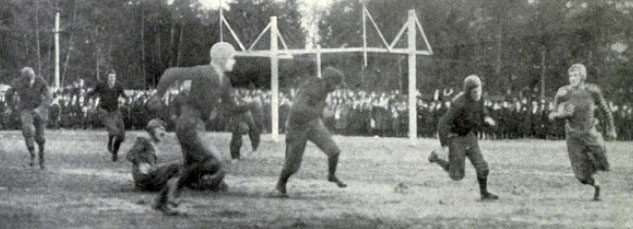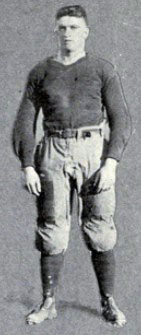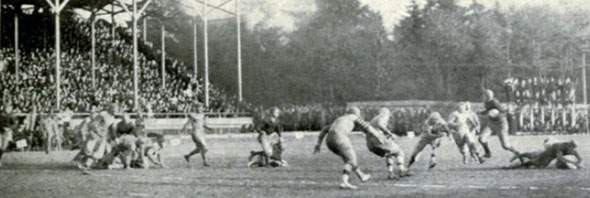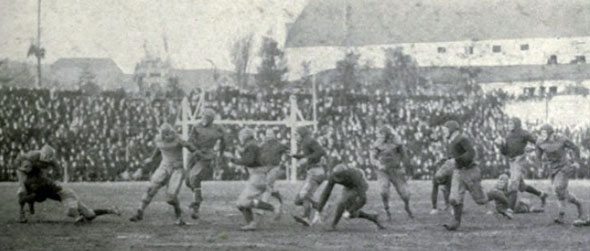Clash of Titans
Games featuring a future Hall of Fame coach on each sideline.
November 30, 1916: California @ Washington
Andy Smith vs Gil Dobie
Huskies Overcome Strife to Beat Bears Again
The Washington Huskies gained new respect for the California Bears after working hard to defeat Andy Smith's first Berkeley squad 13-3 a year after slaughtering the Bears 72-0.
Gil Dobie's team needed to beat Cal in the rematch in Seattle two weeks later in order to win the first championship of the new Pacific Coast Conference and extend the school's incredible streak of undefeated seasons under Dobie to nine.
During the 12 days of preparation for the second clash, events on the Washington campus nearly caused the game to be canceled.
The headline in the November 23 Washington Daily blared: "PLAYERS MAY BE EXPELLED." The second subhead proclaimed: "DRASTIC ACTION FOLLOWS TEAM'S DECISION AT NOON." The third subhead said, "Coach Dobie May Be Dismissed By Board."
The Seattle Post-Intelligencer chimed in: "'U' FOOTBALL SQUAD GOES ON STRIKE." Second subhead: "SUSPENSION OF MEMBER IS RESENTED." Third subhead: "Players Will Announce Their Decision Today."
The furor began when star lineman Bill Grimm was caught cheating on a history exam. The student-run Board of Control voted to suspend Grimm from December 1, 1916 to December 1, 1917. That would allow him to play in the November 30 game against Cal.
But the faculty-run Athletic Committee revised the suspension to start November 20 and end September 1, 1917. That would prevent him from playing in the Cal game but allow him to play during the 1917 football season.
The Athletic Committee was bound by Article 7 of the rules of the Pacific Coast Conference which stated: "No athlete who is found by the faculty to be delinquent in his classroom work shall be permitted to play in any intercollegiate contests." Unfortunately, the Athletic Committee did not cite Article 7 as a factor in Grimm's suspension.
Huskies Vote to Go on Strike
However, the football team felt Grimm's suspension unfairly punished them for an incident they had nothing to do with. So they voted 14-10 to go on strike. In announcing the vote, they insisted that Coach Dobie had nothing to do with their decision. He was trying to remain neutral and not put pressure on either side.
Complicating the situation was the fact that University President Henry Suzzallo was far away on a tour of eastern universities and was not due back until November 28, two days before the big game. In the meantime, he was available only by telegram.
Unfortunately, a telegram sent to Suzzallo reporting on the sequence of events contained errors that made a resolution of the conflict more difficult. The telegram said Grimm was "declared ineligible for football by action of the Board of Control" when it was the Athletic Committee that moved up the suspension date. A second false statement made matters even worse. "Team feels decision unjust, refuses to play Thanksgiving Game. Dobie with team." The last sentence could be interpreted to mean the coach approved of the players' strike. The press reported that Dobie's "sympathies were entirely with the team in their stand."
Lost in the turmoil was an extenuating circumstance. Grimm was one of the players called to duty in the National Guard, which took them out of class for three weeks. Dr. Suzzallo had asked the faculty to give every consideration to Guard members making up their class work. The team felt that professors had not been following that directive.
Cooler Heads Prevail
A week before the Cal game, Dean A. R. Priest met with each of the striking players one at a time. He explained the consequences if the game were canceled. A major concern was the $2,000 guarantee of expenses owed the visiting team. After meeting with the Dean, the 14 strikers voted to stay with their original decision not to play.
However, former team captains as well as influential alumni met with the players that evening and aggressively lobbied them to reconsider. Grimm spoke to each of the players individually to beg them to remember the greater good, forget about him, and play the game.
Perhaps the most effective argument came in a telegram from President Suzzallo. "The honor and courage of the student board of control is superb. Glad faculty and administration have sustained them. Do not permit Grimm to play under any circumstances. The team is not a bunch of individuals, but a set of representatives. It must keep the university honor by complete fulfillment of the agreement with California."
Overwhelmed by the pleas from so many sources, the players reversed their stand and decided to take the field against California. The team drafted a statement reiterating their displeasure with the faculty's decision and citing honor and duty to the students, alumni, and public as the inspiration for their decision to play the game. They also reiterated that the strike "was the uncoerced action of the individuals of the squad, to which Coach Dobie was not a party."
The question became, How well would the Huskies perform after missing two days of practice and undergoing emotional stress as the strike issue was resolved?
Injuries had taken their toll on the Huskies to the point where Dobie would have less than half his starters from the beginning of the season available to face the Bears, who would be hungry to avenge the November 18 defeat, hand Washington its first defeat in nine years, and prevent the Huskies from winning the conference title.
Dobie focused his shortened practice time on defensing Cal's passing attack. As usual, his offensive strategy was to use a small number of plays but execute them with precision and run the ball up the middle. The intent was to control the ball and wear down the defense. One writer predicted that, "California will depend on its speed and an overhead attack to humble the eight-time champions."
The UW Coach went against his decade-long precedent by predicting victory over California.
Cal coach Andy Smith predicted that, if his team didn't win, Washington would know that it had been in a battle. He spent the two weeks of preparation for the second game building up the weak side of his line and installing new plays.
Sportswriters agreed that the second Cal-UW game was the most anticipated contest in the history of West Coast football. An annual "homecoming" football game was not yet common on the West Coast, but numerous UW alumni, some from far away, attended the Thankgiving day game rematch.
The night before the game, enthusiasm reached a fever pitch when hundreds of shouting, singing Washington students staged a serpentine parade through the downtown streets of Seattle.
Record Crowd on Dry Day
The largest crowd to date at University Field, 9,000, was expected. So additional stands were brought in for the game, and 2,000 sideline standing-only tickets were sold. In addition, a large clock was installed at the top of the new scoreboard. It displayed the current score, the time remaining in the quarter, and the down number and yards to go. Previously, only the down box on the sideline showed the down number. That information has been taken for granted for over a century, but it was new and exciting in 1916.
The clear fall day favored the faster visiting squad over UW's bigger, slower crew.

Crowd at University Field (Washington Tyee Yearbook Class of 1917)
The contest was hard-fought from the beginning. Time was called many times "to let some player recover his wind or unlimber a joint that had been folded up the wrong way in a scrimmage."
Bears Miss Chance to Score
The visitors dominated play in the first quarter but had nothing to show for it.
California kicked off and quickly forced a punt. UW T Vic Morrison got off a poor boot - a result of missing practices? - that went straight up and gave the Bears excellent field position when Willis Montgomery made a fair catch on the 15. Cal lined up in placekick formation, but it was a fake that put the ball on the 10. Then Cal tried a pass over the middle that Ching Johnson intercepted to end the threat.

Cal's Fred Brooks runs with the ball. (University of California Blue and Gold Yearbook Class of 1918)
 Leroy Sharp |
Unable to move the ball, the Huskies punted again. They stifled the Bear attack and got the ball back. On the third try, UW was finally able to establish their ball-control game with line smashes up the middle and push the Bears back into their side of the field.
Leroy Sharp, California's swift left half, constantly threatened all afternoon to break away for a touchdown. One writer said, "Many experts say Sharp is the fastest and best all-around football player ever seen in the northwest."
After Ernie Murphy intercepted a Cal pass on UW's 40, the Huskies penetrated Cal territory all the way to the 20 after three successive first downs. Johnson gained 3y around right end before a forward pass fell incomplete. So Ted Faulk tried a field goal that went astray. Neither team came close to scoring after that, and the first half ended scoreless. Washington gained six first downs to Cal's two. |

Cal's Douglas Cohen executes trick play. (University of California Blue and Gold Yearbook Class of 1918)
UW Scores First
The Huskies broke the scoring ice in the third period. UW started from their 40 after receiving a punt. Runs by Bill Hainsworth, Murphy, and Cy Noble gained two first downs to the 28. After Hainsworth gained eight through right tackle, Johnson dashed the remaining 20y diagonally across the field for a touchdown, banging through Sharp the last 2y. Faulk kicked the point. Washington 7 California 0

Brooks plunges through Washington line.
(University of California Blue and Gold Yearbook Class of 1918)
Huskies Double Their Lead
Later in the third quarter, Sharp electrified the crowd when he return a punt 30y to Cal's 40. But C Sandy Wick intercepted a pass and ran 20y to Cal's 30. Faulk passed to Murphy for 8y before Noble gained another eight around left end. Two plays later, Noble threw to Faulk for the touchdown. Faulk again converted. Washington 14 California 0
The rest of the third period and the beginning of the final quarter descended into a punting duel with neither team threatening to score.

Leroy Sharp tackles Vic Morrison. (University of California Blue and Gold Yearbook Class of 1918)
Cal Avoids Shutout
With time running out, Sharp almost single-handedly avoided a shutout for Cal. First, he punted to the UW one. Taking no chances, Washington kicked right back. Sharpe caught the ball and dashed 30y to the ten, dodging tacklers the whole way. Continuing to show his "triple-threat" talents, Sharp threw to Kimble to put the ball on the two with under a minute to play. From there, Carlton "Dummy" Wells scooted off left tackle over the goal. Montgomery added the point. Washington 14 California 7
When the game ended, Husky fans stormed the field. One group hoisted Dobie on their shoulders while another cohort carried Sharp off in an amazing show of sportsmanship and respect for an opponent. The first group the coach all the way to the steps of the gym. When they set him down, the usually dour coach "took off his hat, waved it, and smiled and bowed in evident pleasure." Asked to give a speech, Dobie gave a hint of what was to come when he said, "Goodbye, boys; goodbye boys."
Not So Surprising Aftermath
Dobie had done something that has never been matched to this day in major college football. He never tasted defeat in 11 years of coaching, the last nine of which were spent in Seattle.
It was no secret that Dobie contemplate retiring from coaching after the second Cal game. He had actually handed in his resignation before the last game of the 1915 season. Reports indicated he was tired and needed a break. He also felt that eight years of undefeated play "have dulled the spirt of the purple and gold institution." While Dobie visited his sisters in Berkeley CA, Seattle newspapers speculated about his replacement. But UW's athletic board kept postponing announcement of the new coach.
When Dobie returned from Berkeley, university officials and alumni spent a week trying to convince him to coach another season. This post-resignation attention convinced him that he had more supporters on campus than he realized. So he agreed to return for another year.
But after the 1916 season, there remained factions on the campus who felt that football had become too powerful and needed to be reined in. When President Suzzallo returned to the campus, he studied the issues that arose from Bill Grimm's dismissal from the team. He learned that Dobie had no part in instigating the players' strike and continued to hold practices with the non-striking players.
The Student Board of Control favored keeping Dobie, but they were not invited to a joint meeting of the Board of Control and the Faculty Athletic committee. Incredibly Suzzallo did not attend, but his secretary spoke for him when he declared, "The president deemed that Dobie's maturer judgment should have prevailed when the boys went on their trike, and that instead of upholding the players, he should have upheld the university."
In effect, Suzzallo, who resented the national press Dobie received for his remarkable record, had already made his decision, which was partly based on the false information that Dobie supported the players' strike. All the Board could do was rubber stamp the president's decision.
After saying that he needed time off from coaching, Dobie was persuaded to become the U.S. Naval Academy coach for the 1917 season.
References
From Orphanage to National Champion: Gilmour Dobie Pursuit of Perfection (Kindle), Lynn Borland (2010)
From Orphanage to National Champion: Gilmour Dobie Pursuit of Perfection (Kindle), Lynn Borland (2010)